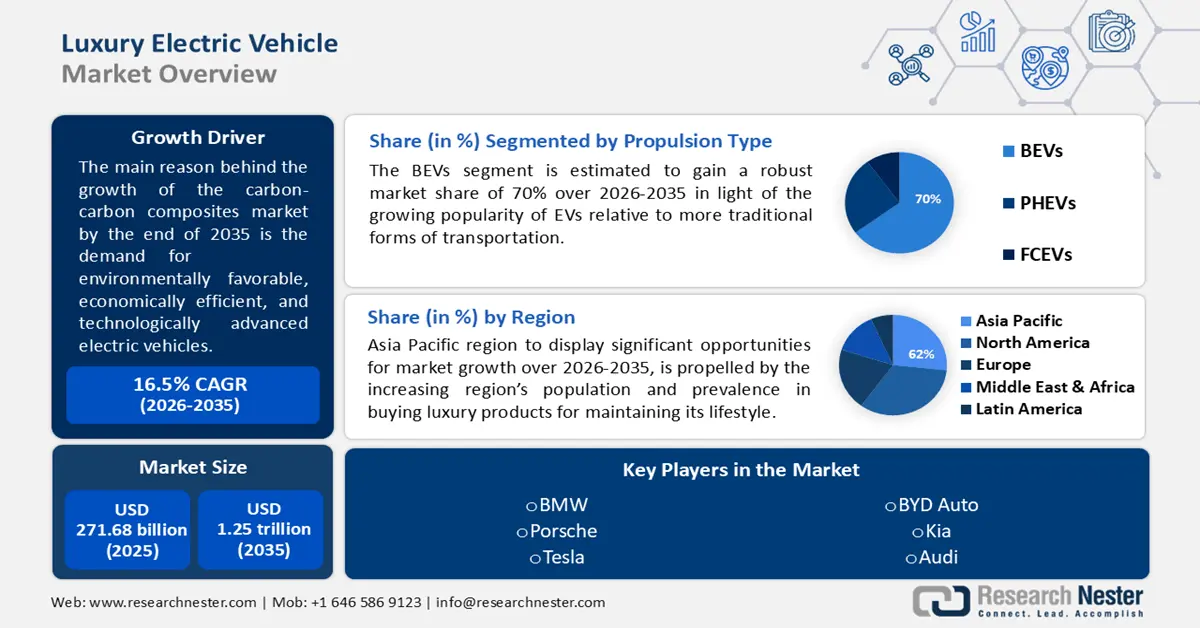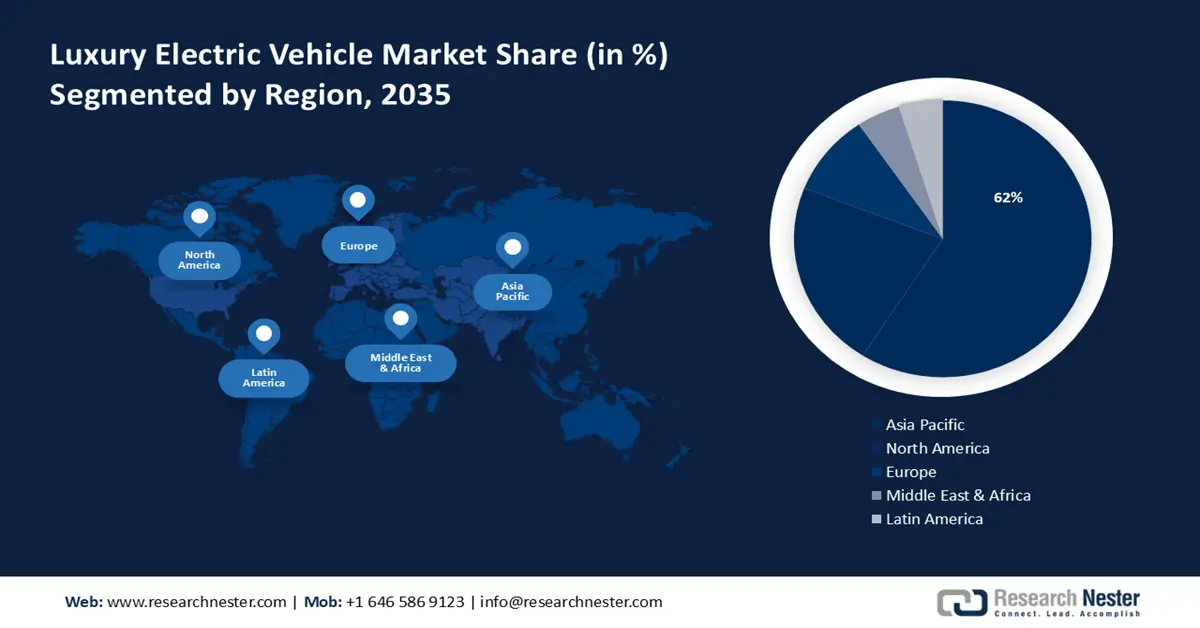Luxury Electric Vehicle Market Outlook:
Luxury Electric Vehicle Market size was valued at USD 271.68 billion in 2025 and is expected to reach USD 1.25 trillion by 2035, registering around 16.5% CAGR during the forecast period i.e., between 2026-2035. In the year 2026, the industry size of luxury electric vehicle is evaluated at USD 312.02 billion.

The luxury electric vehicle market is experiencing significant growth due to the increasing demand for environmentally favorable, economically efficient, and technologically advanced electric vehicles. There is a swift global process of reducing carbon emissions taking place in vehicle transportation.
The use of electric vehicles (EVs) is growing, and technological advancements are continuously being made with the increasing consumer demand thus driving the market growth. In the year 2012, there were 125,000 electric cars sold all around the world. By the year 2036, it is anticipated that more than 2, 00,000 electric cars will be sold every week.
Key Luxury Electric Vehicle Market Insights Summary:
Regional Highlights:
- Asia Pacific luxury electric vehicle market will dominate around 62% share by 2035, driven by increasing prevalence in buying luxury products for maintaining lifestyle.
Segment Insights:
- The car segment in the luxury electric vehicle market is projected to hold a 91% share by 2035, influenced by strong government support for electric vehicle adoption.
- Battery electric vehicle segment in the luxury electric vehicle market is expected to achieve 70% growth by the forecast year 2035, driven by the growing popularity and technological advancements in BEVs.
Key Growth Trends:
- Rapid Infrastructure Development
- Technological Advancements
Major Challenges:
- High Cost
Key Players: Tesla, 2024 Jaguar I-Pace, Lucid Motors, 2023 Mercedes-Benz EQS, BYD Auto, Hyundai Motor Company, Kia, Audi.
Global Luxury Electric Vehicle Market Forecast and Regional Outlook:
Market Size & Growth Projections:
- 2025 Market Size: USD 271.68 billion
- 2026 Market Size: USD 312.02 billion
- Projected Market Size: USD 1.25 trillion by 2035
- Growth Forecasts: 16.5% CAGR (2026-2035)
Key Regional Dynamics:
- Largest Region: Asia Pacific (62% Share by 2035)
- Fastest Growing Region: Asia Pacific
- Dominating Countries: China, United States, Germany, Japan, Norway
- Emerging Countries: China, Japan, South Korea, India, Singapore
Last updated on : 17 September, 2025
Luxury Electric Vehicle Market Growth Drivers and Challenges:
Growth Drivers
-
Mandated Environmental Safety Regulations - Environmental safety rules are projected to boost the premium electric vehicle market. Environmental, health, and safety rules cover issues that may affect all businesses. Environmental safety rules reduce greenhouse gas emissions and promote car electrification.
For instance, On March 20, 2024, EPA announced a final rule, that sets new, more protective standards to reduce harmful air pollutant emissions from light-duty and medium-duty vehicles starting. The final rule builds on EPA's final standards for federal greenhouse gas emissions standards for passenger cars and light trucks for model years 2023 through 2026 to improve public health by reducing vehicle smog- and soot-forming pollution, climate pollution, and fuel and maintenance costs. - Rapid Infrastructure Development - Increasing investments in infrastructure development are expected to drive market growth and play a crucial role in promoting economic growth and development. Infrastructure encompasses the essential physical and organizational structures and facilities required for the smooth operation of a society or industry.
As an example, the Indonesian government has recently announced a highly ambitious plan for the years 2020 to 2024. They are fully committed to investing a staggering USD 400 billion in public infrastructure development by 2024. Therefore, the growth of the luxury electric vehicle market is propelled by infrastructure development. - Technological Advancements - Product innovation is the primary trend that is becoming increasingly popular in the market. Leading corporations in the luxury electric Vehicle industry are dedicated to creating cutting-edge technology to enhance their market status.
In 2023, electric vehicle (EV) sales had a significant 41% surge in comparison to the preceding year. By the year 2035, electric vehicles (EVs) are projected to make up between 40 to 45% of all new car purchases. Nevertheless, the widespread acceptance of electric vehicles relies on advancements in charging infrastructure, intelligent power grids, and battery energy storage technology.
Challenges
- High Cost - Owning an electric car is expensive. Battery cost is the main difference between electric and conventional cars. It alone can save several thousand euros. The battery's raw materials and pricey production techniques are key reasons. A mid-size vehicle with a 20kW battery pack costs roughly 500 euros per kWh. Innovative battery materials with increased energy density and improved production processes should cut these costs by 2020. Per kWh, estimates are 100-250 euros. Electric automobiles cost more, but fuel costs are eliminated if we have a safe and economical energy supply.
Concerns about battery life - This is especially important in winter, when below-freezing temperatures can reduce an EV's battery range. People worry about how far they can drive an EV before finding a charging station and waiting for a long charge session. Most EVs can travel 200-300 miles on a charge in mild weather. For long road trips, weekend getaways, driving vacations, or freezing conditions, EV owners may require a charge every 3-4 hours.
Luxury Electric Vehicle Market Size and Forecast:
| Report Attribute | Details |
|---|---|
|
Base Year |
2025 |
|
Forecast Period |
2026-2035 |
|
CAGR |
16.5% |
|
Base Year Market Size (2025) |
USD 271.68 billion |
|
Forecast Year Market Size (2035) |
USD 1.25 trillion |
|
Regional Scope |
|
Luxury Electric Vehicle Market Segmentation:
Propulsion Type Segment Analysis
Battery electric vehicle segment is likely to dominate over 70% luxury electric vehicle market share by 2035, in light of the growing popularity of EVs relative to more traditional forms of transportation. Moreover, it is anticipated that hydrogen fuel cell vehicles will capture a substantial portion of the market in the projected time period.
Furthermore, projected enhancements in the range and cost of battery electric vehicles (BEVs) indicate that consumers are anticipated to value many BEVs as much as or more than their gasoline-powered equivalents by the year 2035.
Based on a comprehensive simulation, it is expected that by 2030, if all gasoline vehicles were to provide a battery electric vehicle (BEV) option, the majority of new automobile purchases and a significant portion of new sport-utility vehicle (SUV) purchases might be electric. This shift is mostly attributed to anticipated advancements in technology.
Vehicle Type Segment Analysis
By 2035, car segment is poised to account for around 91% luxury electric vehicle market share. The growth of the segment is attributed due to the increasing adoption of technologies by consumers in the form of electric vehicles. The significant growth in electric car sales can be largely due to consistent and substantial government backing.
The surge in electric vehicle registrations led to a rise in the manufacturing of automotive lithium-ion batteries. In 2022, there was a 66% surge in demand for electric vehicle (EV) batteries compared to the previous year, driven by the ongoing growth of EV sales across all markets, with China leading the way. The rise in battery demand can be ascribed to the increasing sales of battery electric vehicles (BEV).
Our in-depth analysis of the global market includes the following segments:
|
Propulsion Type |
|
|
Vehicle Type |
|

Vishnu Nair
Head - Global Business DevelopmentCustomize this report to your requirements — connect with our consultant for personalized insights and options.
Luxury Electric Vehicle Market Regional Analysis:
APAC Market Insights
Asia Pacific industry is set to dominate majority revenue share of 62% by 2035. The region’s continuous dominance in the predicted timeframe is also due to its increasing prevalence in buying luxury products for maintaining its lifestyle. The growing population will require inexpensive transportation, which will boost the market in the forecast future.
In 2019, China held approximately a 2% market share, which increased to 6% in 2020. Between 2012 and 2020, China exported just over 60,000 electric vehicles (EVs), accounting for 3% of the worldwide market value. It is expected that this number will continue to increase in the future.
Hyundai intends to launch a 7-seater electric SUV called the IONIQ 7 in South Korea. This vehicle will be the largest electric offering from the Korean automaker. Anticipated to be released for sale in 2024, it is quite likely that the carmaker will reveal the final form of the electric SUV in 2023, hence stimulating market expansion.
North America Market Insights
The expansion of the industry is ascribed to the rising customer inclination towards luxury, which is propelling the luxury electric vehicle market. In 2022, North America has produced 15 million vehicles. The car manufacturing sector in this region has experienced significant and continuous technological advancements in recent decades.
Tesla's Supercharger network is unbeatable, and the Model Y is currently one of the top-selling cars in the United States, whether electric or not.
Canada has launched an incentive scheme that provides a 5 thousand US dollars reward for qualified electric vehicle purchases or leases. This incentive is applied at the time of purchase by the dealership, after validating the eligibility of the buyer. Consequently, this is driving the expansion of the market.

Luxury Electric Vehicle Market Players:
- Bayerische Motoren Werke AG
- Company Overview
- Business Strategy
- Key Product Offerings
- Financial Performance
- Key Performance Indicators
- Risk Analysis
- Recent Development
- Regional Presence
- SWOT Analysis
- Porsche
- Tesla
- 2024 Jaguar I-Pace
- Lucid Motors
- 2023 Mercedes-Benz EQS
- BYD Auto
- Hyundai Motor Company
- Kia
- Audi
The Luxury Electric Vehicle industry is mostly controlled by prominent market participants who are gaining influence in the market through the implementation of various methods, such as mergers and acquisitions.
Recent Developments
- BMW Group (10.04.2024) - continues on BEV growth path: Milestone of one million fully-electric vehicles reached +++ BMW Group sales climb to 594,671 units in first quarter +++ Growth drivers: fully-electric vehicles and models from high-end premium segment +++ BMW brand: Global sales up +2.5%; deliveries of fully-electric vehicles increase by +40.6% +++ Higher BEV sales in all major regions of the world +++ Jochen Goller: “Delivery of one-millionth fully-electric vehicle confirms the attractiveness of our product portfolio.” +++
- Porsche – announced, Macan is the official EV of the 2024 Met Gala. Selected gala guests are among the very first in the world to experience the new all-electric Macan as they ride to and from the event. In parallel, Porsche is working with Vogue to produce a branded content series entitled True Essence, with an episode featuring Catherine Holstein, Founder and Creative Director of Khaite. Together with Vogue, Porsche will showcase the new car in digital and print ads, in addition to publishing other branded content on Vogue’s owned and social channels.
- Report ID: 6189
- Published Date: Sep 17, 2025
- Report Format: PDF, PPT
- Explore a preview of key market trends and insights
- Review sample data tables and segment breakdowns
- Experience the quality of our visual data representations
- Evaluate our report structure and research methodology
- Get a glimpse of competitive landscape analysis
- Understand how regional forecasts are presented
- Assess the depth of company profiling and benchmarking
- Preview how actionable insights can support your strategy
Explore real data and analysis
Frequently Asked Questions (FAQ)
Luxury Electric Vehicle Market Report Scope
Free Sample includes current and historical market size, growth trends, regional charts & tables, company profiles, segment-wise forecasts, and more.
Connect with our Expert
Copyright @ 2026 Research Nester. All Rights Reserved.




